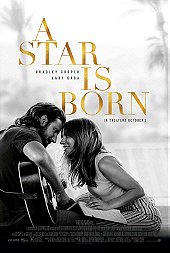Color me surprised at this fourth (fifth if you count 1932’s What Price Hollwood?) dip into the well has produced such an enjoyable version. Of course, it’s immediate predecessor was the property’s nadir, Barbra Streisand’s onerous 1976 version, so nearly anything would’ve registered as an improvement. But 2018’s version of A Star Is Born isn’t just an improvement, it’s a well-made romantic melodrama that’s second only to Judy Garland’s immortal 1954 version.
Everyone knows the barebones of this story: fading star, either a movie star or a singer, meets undiscovered girl talent, either aspiring actress or singer, and champions her career. They fall in love, and she remains loyal to him as his self-destruction threatens to destroy her nascent career in addition to his crumbling one. The final moments, if done right, are tearjerkers of the highest order as the fading star commits suicide and the ingénue pays tribute as a moment of personal and artistic triumph overcoming her sorrow. Roll the end credits.
This version of A Star Is Born proves how much wiggle room there can be between those signposts. Much like the 1976 version, our doomed romantic pair are musicians. He’s a country/blues rocker, and she’s a budding pop star in the making. It makes sense to keep this story change from the prior film as the mystique of movie stars crumbled with the passing of the studio era. There’s no longer a large publicity department churning out fictional backstories on its stable of stars, remaking them into totems and cinematic idols, but the music industry still allows for pop stars to create artificial personas to hide behind.
Speaking of, one of the genius moves this film makes was to cast Lady Gaga as the aspiring pop starlet. Gaga’s exactly the kind of persona-heavy pop star I’m talking about. Who is the real person behind the construct, and does it matter? Well, A Star Is Born has moments of doubt or criticism that feel lifted from her time spent slumming away in dive bars finessing her kooky outfits and shiny dance-pop. Whether or not they’re directly lifted is immaterial, they feel real and Gaga plays them with an honesty and naked emotional candor that’s quite refreshing.
It’s not just that Gaga’s appearance lends the film a kind of honesty that the presence of an actress who can sing wouldn’t, but that we’re familiar enough with her as a construct that it’s revelatory to watch the real human being underneath it all. Gaga’s performance is candid, truthful, and completely free of artifice. There’s honest to god quaking, aching vulnerability that’s endearing. You root for her to succeed, you’re invested in her triumphs, and you understand why she sticks it out with this man that’s a liability to her professional and personal life at numerous points.
Yet A Star Is Born 2018 differs from its predecessors in a highly noticeable way. Janet Gaynor and Judy Garland’s versions gave the two roles near equal footing even if the female lead got just a touch more sympathy and screen time, and the Streisand version orbited around its star to the occasional detriment of everything else. This version stacks the audience sympathy, understanding, and development in favor of Bradley Cooper’s doomed rock star with Gaga routinely playing second fiddle. This A Star Is Born is more of his story then it is hers or theirs.
Maybe the fact that Cooper co-wrote, directed, and starred in it has something to do with that, or maybe it’s that there’s such a strong focus on the trauma, addiction, recovery, and mental illness of his rock star that Gaga’s rapid ascent up the career ladder couldn’t help but fade away. Cooper’s performance is an absolute marvel. The choice to end the film with Gaga singing the love song he wrote for her only for it to dissolve to a happy time of them goofing around the piano and figuring it out is a smart one. It ends the film on a note of creative expression and romance and differentiates it from the weepy downbeats that end the prior films. I wouldn’t call it a happy ending, but it’s a more emotionally complex one than the others.
It’s Sam Elliott’s last minute speech, the one about how there only being a few notes between an octave and it’s how you play them that matters, that summarizes the film, and works as an argument for it. If we can sit through endless remakes of other properties, Robin Hood and King Arthur: Legend of the Sword as very recent examples, then surely we can afford space for another spin on this story. Like any other long running and heavily adapted property, some versions are better than others, so props to Cooper for making what is easily the second best. It’s a well-worn story told with grit, humor, romance, music, and tremendous empathy. I’m shocked at its greatness just as much as you are.
 Login
Login